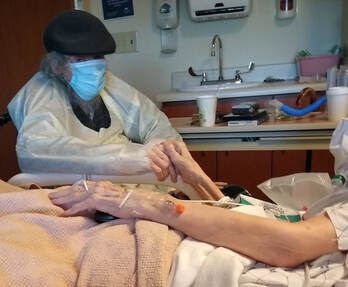Have you ever wondered why everyone is looking for love? Almost every popular song in human history, and almost every movie ever made and every story every told, describes someone's search for love. We all thirst for love because we are made in God’s image, who is Himself an eternal exchange of love between three persons. Mother Teresa was fond of saying that “you were created for greater things: to love and to be loved.” But what is “love,” and where do we find it?
The other day I saw a rainbow-colored sign that said “Love is love.” Well, that’s not very helpful. It’s a very poor definition whose subject and predicate are identical, kind of like saying “Nuclear fusion is nuclear fusion.” A real definition requires both a difference and a similarity between subject and predicate. How about St. John’s definition again: “God is love”? This definition anchors love in something greater than ourselves. It defines love as a “longing,” always incomplete, always desiring more. That sounds a lot more like the love I’ve experienced, and that I’ve heard described in literature.
The month of June is set apart for “love.” Do you know what special celebration of love happens every June in San Francisco? That’s right: the Feast of the Sacred Heart. We sing sacred songs to the Heart of Jesus, proclaiming that God has a heart, and that heart thirsts for you and for me. But, in fact, images of the Sacred Heart of Jesus are not what you will see in downtown San Francisco this month. There is another image on every city lampost in the Castro, on corporate advertisements, on sports teams jerseys, on TV ads, and on internet pages this month: the rainbow flag. It’s even flying from the Vatican embassy in Rome. People say June is “Pride Month.”
It's my job as a Catholic priest, and your pastor, to preach Catholic truth, and to point out errors that harm our faith. It is sometimes a distasteful task, especially when it means speaking against what most people, and most Catholics, have embraced. But let me say clearly that the promotion of homosexual acts—the rainbow flag—is incompatible with Catholicism.
For starters, “pride” is a sin, in fact a “capital sin,” and the first of the capital sins. We do use the word “pride” in some virtuous ways, such as “I’m proud of my children” or “we are proud of our school,” meaning “we appreciate these good things.” But what gay activists, and their corporate sponsors, promote is not a good thing. Rainbow activists are “proud” of their rebellion against “the Laws of Nature and of Nature’s God,” to borrow a phrase from our nation’s Declaration of Independence. Rebellion against nature always ends badly, for "Mother Nature is not mocked."
Many suffer from same sex attraction, gender dysphoria, and other sexual disorders in our disordered society. We all suffer from one kind of confusion or another. But we must help each other overcome rather than celebrate our disorders. We must be clear: the rainbow flag is not for Catholics. It rejects the Gospel of Jesus Christ. And we must make a decision: either to celebrate disordered sexual acts or to lament them. There is no middle ground, as the rainbow coalition has made quite clear: those who are not with gay pride are against gay pride.
How about if we replaced “pride month” with “humility month?” Shouldn’t Christians seek virtues like humility and purity rather than pride and impurity? We all want love. Democrats and Republicans, communists and monarchists, progressives and traditionalists: every last one of us wants “love.” And so I return to my original question: where do we find love? We find it in the family, which John Paul II described as “the school of love.” If we don’t learn how to love from our mothers and fathers —how to share, how to be patient, how to sacrifice ourselves for others—we will never learn how to love. And it is precisely the family which the various atheistic movements—of which the rainbow coalition is the most well-funded at the moment—are trying to eliminate.
They’ve made impressive progress. Less than half of the children in America’s cities grow up in an unbroken family. To rebuild a healthy society built of healthy families, we look to the Holy Trinity, the “family of God,” the model that powers every human family and every community. To restore real love, we cannot do better than imitate the humility, the purity, and the charity of the Father, the Son, and the Holy Spirit.



 RSS Feed
RSS Feed